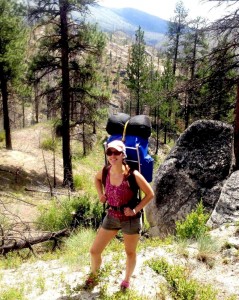

Britt Lamotte
Panoramic Living
Next week I graduate from the University of Idaho. It makes me laugh to imagine opening up the mail after they send out my diploma this summer, how small it’s going to seem compared to what I actually learned during my years at school. It also makes me laugh because I’m job hunting and have no idea where the envelope holding my diploma should be addressed.
Oh, well. Idaho requires an appreciation for the unexpected from its residents. We expect the weather to surprise us as often as the pot holes in the roads do, and with cardigans and four-wheel drive we try to handle it gracefully. It’s only natural in a state famous for ski hills, sand dunes, whitewater and big open spaces; the northern and southern halves connected only by a two-lane scenic highway. When the days of skiing and golfing finally eclipse we know spring has come back.
It’s appropriate that the character of our residents should match the range of geography. This state was founded by people who wandered away from old identities, came out west and stopped a few hundred miles short of the Pacific Ocean. They stayed here to grow wheat, mine silver and cut lumber… or to find solitude. With nearly 4 million acres of designated wilderness, public lands account for a wonderful 68 percent of Idaho. Increasingly more difficult to find in a culture of data collection and surveillance, privacy here is still free for the taking. It’s outside.
A good deal of my life is spent outside travelling, so when I talk about ‘home’ I’m talking about all 53.5 million acres of Idaho. Here, there’s never an issue of being far from the outdoors; it’s always close. The issue is how many days we can spend salmon fishing, how long we should hang a deer, how many miles we can fit into a weekend trip. Those are good problems. When I think about where my diploma should be mailed, the issue is money. With student loans to repay it’s hard to dismiss money as the biggest factor in deciding where to live after graduation. There’s a need for compromise in wanting to balance a love for the outdoors with an ability to earn enough for a debt-free life.
But that’s how it goes, or at least that’s how it seems right now. It could be that relocating for a new job won’t really be a choice between dollar bills and green hills, although hills in the west are usually not green for more than a season. When I lived in the California high-desert for a year or so I felt lucky to earn better labor benefits and still have ample hiking outside my door, near the Pacific Crest Trail. The abundance of rattlesnakes, including the infamous Mojave Green, was not the big problem I’d first imagined and life felt pretty balanced. The Inyo National Forest was just three hours north.
When I think about staying here in Idaho – with the highest percent of workers earning minimum wage or less, where three of every four new jobs created in 2012 came from the service sector – I question whether I can afford to live near the rivers and forests I love. It’s always a dilemma of conservation versus commerce in a state still reeling from the death of our lumber towns but I don’t believe the solution is federal land transfers, allowing our public acres to be parceled off in private sales. I don’t know if I can afford to live here now but I expect our public lands to stay public, otherwise what is there to love? What would we come back to?
“It is not an unusual life-curve for Westerners – to live in and be shaped by the bigness, sparseness, space, clarity, and hopefulness of the West, to go away for study and enlargement and the perspective that distance and dissatisfaction can give, and then to return to what pleases the sight and enlists the loyalty and demands the commitment,” Wallace Stegner wrote.
I think he’s right. Maybe that little diploma from the University of Idaho is my passport, and also a ticket back home for when I get the call. I still have an appreciation for the unexpected.
Britt Lamotte will graduate May 2014 with a degree in public relations from the UI’s accredited School of Journalism and Mass Media. A fifth-generation Idahoan, Britt started trout fishing with her great-grandmother before she could read. She likes to pack a harmonica for salmon fishing trips and plans to build a career in conservation policy.





This is terrific.
I enjoyed this article and as an Idahoan, I hope we can offer salaries to keep our grads in the state someday soon.